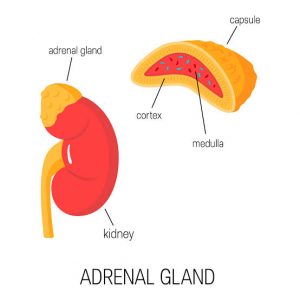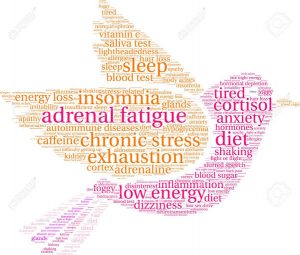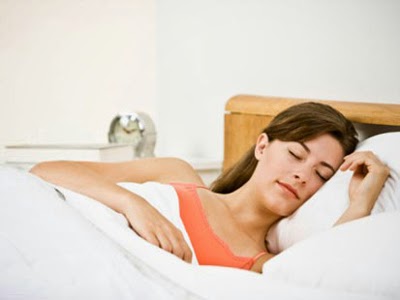
OVERVIEW
Adrenal fatigue is a collection of nonspecific symptoms ranging from body aches, fatigue, nervousness, sleep disturbances and some digestive problems. These complaints somewhat mimic signs of adrenal diseases, syndromes and medical conditions.
Proponents always paint adrenal fatigue as a mild form of adrenal dysfunction, but it isn’t an accepted medical diagnosis.
According to Mayo clinic, adrenal insufficiency can be diagnosed by blood tests and special stimulation tests that show inadequate levels of adrenal hormones.
The unproven theory behind adrenal fatigue is that your adrenal glands are unable to keep pace with the demands of perpetual fight-or-flight arousal. As a result, they can’t produce quite enough of the hormones you need to feel good. Existing blood tests, according to this theory, aren’t sensitive enough to detect such a small decline in adrenal function — but your body is.
Most frustrating situation ever is having signs and symptoms wrongly diagnosed by unqualified practitioners.
Unproven remedies for so-called adrenal fatigue may leave you feeling sicker, while the real cause — such as depression or fibromyalgia — continues to take its toll.
THE CONCEPT OF ADRENAL FATIGUE
Symptoms associated with ‘adrenal fatigue’ include fatigue, unexplained weight loss, low blood pressure and lightheadedness, darkening of the skin, loss of body hair, body aches, hormone imbalance, poor digestion, insomnia, sleep disorders, lowered immune system, inability to cope with stress and loss of concentration.

According to a systemic review of adrenal fatigue literature, published in the journal of BMC Endocrine Disorders, with 58 analysed studies, testing used in most studies included direct awakening cortisol, cortisol awakening response and salivary cortisol rhythm.
Researchers found conflicting results and concluded there is no firm evidence that the condition exists.
It is very important to note and understand the difference between adrenal insufficiency and adrenal fatigue, sometimes, the symptoms seem to overlap and look alike. People with adrenal insufficiency often experience joint pain, nausea, vomiting, diarrhea and dry skin asides fatigue.Adrenal insufficiency is diagnosed by a physician through ACTH Simulation and Insulin-Insulin Hypoglycemia tests.
OTHER POTENTIAL EXPLANATIONS:
These might include thr belief that the hallmark symptom of adrenal fatigue, which is fatigue may just be related to other diseases or presence of long term stress factors. For example, conditions that might mimic symptoms of AF include anaemia, thyroid disease, growth hormone deficiency, depression, fibromyalgia, menopause etc.
It is adviceable that registered dietitians explore symptoms, medical history and lifestyle factors during nutrition assessment of a patient inquiring about adrenal fatigue.
PROPOSED INTERVENTION:
This includes moderate exercise, an adequate diet that supports adequate blood sugar regulation (diets rich in pulses, whole wheat, complex carbohydrates and protein (both plant and animal sources), adequate sleep, stress relief and management techniques.
Avoiding alcohol and caffeine is adviceable as they can trigger the production of cortisol which could cause a spike in insulin production and increase stress levels.
ADRENAL CONDITIONS:
There are so many conditions related to the adrenal glands, but to mention a few important ones, we have:
- Addisons disease: primary adrenal insufficiency caused by insufficient steroid hormone production despite adequate adrenocorticotropic hormone (ACTH) levels. Low ACTH hormone levels are caused by a problem associated with the pituitary gland and are considered secondary adrenal insufficiency. Symptoms include low blood pressure, fatigue, loss of appetite, nausea and vomiting, dysregulation of blood glucose, darkening of skin.
- Adrenal insufficiency: this happens when the adrenal glands do not produce enough cortisol; symptoms include fatigue and muscle weakness.
- Adrenal crisis: is caused by chronic adrenal insufficiency, addisons disease, tumors and severe sepsis. Symptoms include abdominal pains, confusion or loss of consciousness, loss of appetitie, dehydration.
- Cushings syndrome: this occurs when there is excessive levels of cortisol in the blood stream as a result of exogenous or endogenous factors.
Exogenous: steroids
Endogenous: adrenal or pituitary gland
tumour.
Symptoms include weight gain, depression,
mucle loss.
- Primary hyperaldosteronism: occurs when the adrenal glands produce too much of the hormone aldosterone (causing hypertension and low blood potassium levels), it can be caused by hyperactivity in one or both adrenal glands or sometimes related to an adrenal tumour.
Symptoms include high blood pressure, heartache, fatigue, low potassium levels and numbness.
Notice how fatigue is a symptom of all adrenal conditions? Stress management techniques should be learned and maintained by all and sundry to avoid stories that touches.


